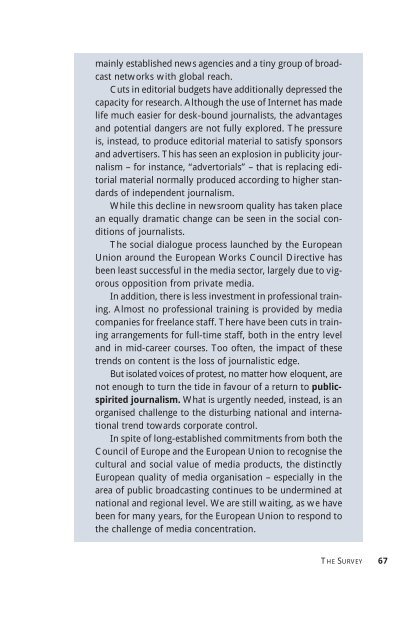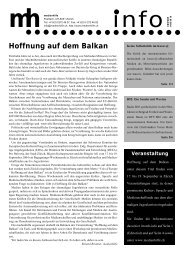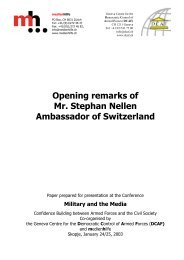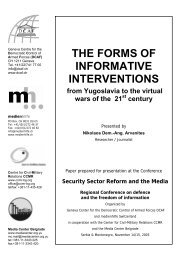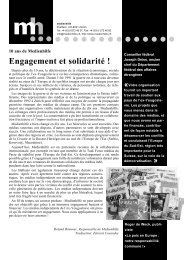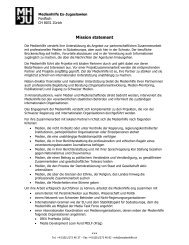The Impact of Media Concentration on Professional ... - OSCE
The Impact of Media Concentration on Professional ... - OSCE
The Impact of Media Concentration on Professional ... - OSCE
Create successful ePaper yourself
Turn your PDF publications into a flip-book with our unique Google optimized e-Paper software.
mainly established news agencies and a tiny group <str<strong>on</strong>g>of</str<strong>on</strong>g> broadcastnetworks with global reach.Cuts in editorial budgets have additi<strong>on</strong>ally depressed thecapacity for research. Although the use <str<strong>on</strong>g>of</str<strong>on</strong>g> Internet has madelife much easier for desk-bound journalists, the advantagesand potential dangers are not fully explored. <str<strong>on</strong>g>The</str<strong>on</strong>g> pressureis, instead, to produce editorial material to satisfy sp<strong>on</strong>sorsand advertisers. This has seen an explosi<strong>on</strong> in publicity journalism– for instance, “advertorials” – that is replacing editorialmaterial normally produced according to higher standards<str<strong>on</strong>g>of</str<strong>on</strong>g> independent journalism.While this decline in newsroom quality has taken placean equally dramatic change can be seen in the social c<strong>on</strong>diti<strong>on</strong>s<str<strong>on</strong>g>of</str<strong>on</strong>g> journalists.<str<strong>on</strong>g>The</str<strong>on</strong>g> social dialogue process launched by the EuropeanUni<strong>on</strong> around the European Works Council Directive hasbeen least successful in the media sector, largely due to vigorousoppositi<strong>on</strong> from private media.In additi<strong>on</strong>, there is less investment in pr<str<strong>on</strong>g>of</str<strong>on</strong>g>essi<strong>on</strong>al training.Almost no pr<str<strong>on</strong>g>of</str<strong>on</strong>g>essi<strong>on</strong>al training is provided by mediacompanies for freelance staff. <str<strong>on</strong>g>The</str<strong>on</strong>g>re have been cuts in trainingarrangements for full-time staff, both in the entry leveland in mid-career courses. Too <str<strong>on</strong>g>of</str<strong>on</strong>g>ten, the impact <str<strong>on</strong>g>of</str<strong>on</strong>g> thesetrends <strong>on</strong> c<strong>on</strong>tent is the loss <str<strong>on</strong>g>of</str<strong>on</strong>g> journalistic edge.But isolated voices <str<strong>on</strong>g>of</str<strong>on</strong>g> protest, no matter how eloquent, arenot enough to turn the tide in favour <str<strong>on</strong>g>of</str<strong>on</strong>g> a return to publicspiritedjournalism. What is urgently needed, instead, is anorganised challenge to the disturbing nati<strong>on</strong>al and internati<strong>on</strong>altrend towards corporate c<strong>on</strong>trol.In spite <str<strong>on</strong>g>of</str<strong>on</strong>g> l<strong>on</strong>g-established commitments from both theCouncil <str<strong>on</strong>g>of</str<strong>on</strong>g> Europe and the European Uni<strong>on</strong> to recognise thecultural and social value <str<strong>on</strong>g>of</str<strong>on</strong>g> media products, the distinctlyEuropean quality <str<strong>on</strong>g>of</str<strong>on</strong>g> media organisati<strong>on</strong> – especially in thearea <str<strong>on</strong>g>of</str<strong>on</strong>g> public broadcasting c<strong>on</strong>tinues to be undermined atnati<strong>on</strong>al and regi<strong>on</strong>al level. We are still waiting, as we havebeen for many years, for the European Uni<strong>on</strong> to resp<strong>on</strong>d tothe challenge <str<strong>on</strong>g>of</str<strong>on</strong>g> media c<strong>on</strong>centrati<strong>on</strong>.THE SURVEY 67


